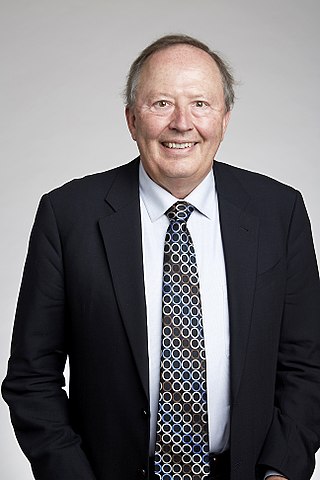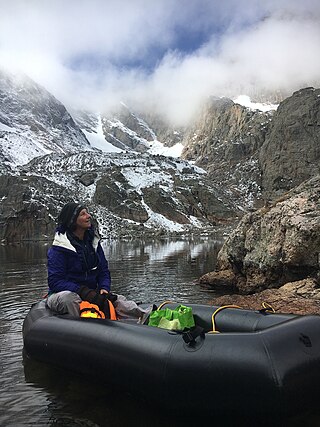Related Research Articles

George David Tilman, ForMemRS, is an American ecologist. He is Regents Professor and McKnight Presidential Chair in Ecology at the University of Minnesota, as well as an instructor in Conservation Biology; Ecology, Evolution, and Behavior; and Microbial Ecology. He is director of the Cedar Creek Ecosystem Science Reserve long-term ecological research station. Tilman is also a professor at University of California, Santa Barbara's Bren School of Environmental Science & Management.
Mary K. Firestone is a professor of soil microbiology in the Department of Environmental Studies, Policy, and Management at the University of California, Berkeley and a member of the National Academy of Sciences. Her laboratory's research focuses on the ecology of microbes in various soils, and their contribution to the carbon cycle and nitrogen cycle in particular.

Diana Harrison Wall is the founding director of the School of Global Environmental Sustainability, a distinguished biology professor, and senior research scientist at the Natural Resource Ecology Laboratory at Colorado State University. She is an environmental scientist and a soil ecologist and her research has focussed on the Antarctic McMurdo Dry Valleys. Wall investigates ecosystem processes, soil biodiversity and ecosystem services and she is interested in how these are impacted by global change. The Wall Valley was named after her in recognition of her research in the McMurdo Dry Valleys. Wall is a globally recognised leader and speaker on life in Antarctica and climate change.
Jamuna Sharan Singh is an Indian ecologist, academic and a former professor of botany and ecological sciences at Banaras Hindu University. He is known for his studies on the grassland ecosystems which are reported to have assisted in the better management of tropical grasslands. He is an elected fellow of the Indian National Science Academy, Indian Academy of Sciences, The World Academy of Sciences and the National Academy of Sciences, India. The Council of Scientific and Industrial Research, the apex agency of the Government of India for scientific research, awarded him the Shanti Swarup Bhatnagar Prize for Science and Technology, one of the highest Indian science awards, in 1980, for his contributions to biological sciences.
Sarah E. Hobbie is an American ecologist, currently at the University of Minnesota, a National Academy of Sciences Fellow for Ecology, Evolution and Behavior in 2014 and a formerly Minnesota McKnight Land-Grant Professor.

Carbon farming is a name for a variety of agricultural methods aimed at sequestering atmospheric carbon into the soil and in crop roots, wood and leaves. The aim of carbon farming is to increase the rate at which carbon is sequestered into soil and plant material with the goal of creating a net loss of carbon from the atmosphere. Increasing a soil's organic matter content can aid plant growth, increase total carbon content, improve soil water retention capacity and reduce fertilizer use. Carbon farming is one component of climate-smart agriculture.

Sharon J. Hall is an ecosystem ecologist and associate professor at the School of Life Sciences at Arizona State University. Her research focuses on ecosystem ecology and the ways that human activity interacts with the environment.
Tamara Jane Zelikova is a climate change scientist, advocate and communicator interested in the impacts of environmental change on natural and managed ecosystems. Her interests are broad and include tropical biogeochemistry, as well as the effects of climate change on organisms big and small. She combines a strong emphasis on research with an interest in science communication and outreach, thinking about ways to expand the role of science in tackling global issues.
Wendy Yang is an associate professor of Plant Biology and Geology at the University of Illinois Urbana-Champaign where she works on soil biogeochemistry and ecosystem ecology.
Whendee Silver is an American ecosystem ecologist and biogeochemist.
Nancy B. Grimm is an American ecosystem ecologist and professor at Arizona State University. Grimm's substantial contributions to the understanding of urban and arid ecosystem biogeochemistry are recognized in her numerous awards. Grimm is an elected Fellow of the American Geophysical Union, Ecological Society of America, and the American Association for the Advancement of Science.

Jill S. Baron is an American ecosystem ecologist specializing in studying the effects of atmospheric nitrogen deposition in mountain ecosystems. She is a senior scientist at the United States Geological Survey and a senior research ecologist at the Natural Resource Ecology Laboratory at Colorado State University.
Jana Compton is a research ecologist for the United States Environmental Protection Agency's (EPA) office of research and development. Her work focuses on identifying sources of nitrogen pollution and connecting those issues to how they effect our ecosystem services.
Elisabeth Holland is an American climate scientist who focuses on how the carbon and nitrogen cycles interact with earth systems. She has become a key player in the international climate debate. She is currently a professor of climate change at the University of the South Pacific. She is also the director of the Pacific Center for Environmental and Sustainable Development.
M. Francesca Cotrufo is a soil ecologist who focuses her work on litter decomposition and the dynamics of soil organic matter. She is currently a Professor and Associate Head in the Department of Soil and Crop Sciences, as well the Senior Scientist at the Natural Resource Ecology Lab, at Colorado State University.
Elizabeth T. Borer is an American ecologist and a professor of ecology, Evolution and Behavior in the College of Biological Sciences at the University of Minnesota.
Aimée Classen is an American ecologist who studies the impact of global changes on a diverse array of terrestrial ecosystems. Her work is notable for its span across ecological scales and concepts, and the diversity of terrestrial ecosystems that it encompasses, including forests, meadows, bogs, and tropics in temperate and boreal climates.
Carly Stevens is a professor of plant ecology and soil biogeochemistry at University of Lancaster, UK. Her work focuses on how changes in the atmospheric nitrogen cycle affect plant communities, particularly grasslands.
Serita D. Frey is an American academic and ecologist, who serves as Professor of Environmental Science at the University of New Hampshire. Her research considers how human activities impact terrestrial ecosystems.
Joan Gardner Ehrenfeld was an American environmental scientist who was a professor at Rutgers University. Her research considered invasive species and ecology. She was elected Fellow of the American Association for the Advancement of Science in 2000.
References
- 1 2 Dennehy, Kevin (7 September 2016). "Ecologist Indy Burke Takes the Reins". Yale School of Forestry & Environmental Studies. Retrieved 2020-03-06.
- 1 2 "Ingrid Burke - University Distinguished Teaching Scholars". udts.colostate.edu. Retrieved 2020-03-09.
- ↑ "Biogeochemist Indy Burke named dean of Yale's School of Forestry & Environmental Studies". YaleNews. 2016-07-20. Retrieved 2020-03-06.
- 1 2 3 "Curriculum Vitae | Ingrid C. "Indy" Burke, Ph.D." environment.yale.edu. Retrieved 2020-03-06.
- ↑ "Board of Directors". The Conservation Fund. Retrieved 2020-03-09.
- ↑ "A Regional Assessment of Land Use Effects on Ecosystem Structure and Function in the Central Grasslands | Research Project Database | Grantee Research Project | ORD | US EPA". cfpub.epa.gov. Retrieved 2020-03-08.
- ↑ Foster, David; Swanson, Frederick; Aber, John; Burke, Ingrid; Brokaw, Nicholas; Tilman, David; Knapp, Alan (2003). "The Importance of Land-Use Legacies to Ecology and Conservation". BioScience. 53 (1): 77. doi: 10.1641/0006-3568(2003)053[0077:TIOLUL]2.0.CO;2 . ISSN 0006-3568.
- ↑ Burke, I. C.; Yonker, C. M.; Parton, W. J.; Cole, C. V.; Flach, K.; Schimel, D. S. (1989). "Texture, Climate, and Cultivation Effects on Soil Organic Matter Content in U.S. Grassland Soils". Soil Science Society of America Journal. 53 (3): 800–805. Bibcode:1989SSASJ..53..800B. doi:10.2136/sssaj1989.03615995005300030029x. ISSN 1435-0661.
- ↑ Parton, William; Silver, Whendee L.; Burke, Ingrid C.; Grassens, Leo; Harmon, Mark E.; Currie, William S.; King, Jennifer Y.; Adair, E. Carol; Brandt, Leslie A.; Hart, Stephen C.; Fasth, Becky (2007-01-19). "Global-Scale Similarities in Nitrogen Release Patterns During Long-Term Decomposition" . Science. 315 (5810): 361–364. Bibcode:2007Sci...315..361P. doi:10.1126/science.1134853. ISSN 0036-8075. PMID 17234944. S2CID 40017189.
- ↑ Paruelo, José M.; Epstein, Howard E.; Lauenroth, William K.; Burke, Ingrid C. (1997). "Anpp Estimates from Ndvi for the Central Grassland Region of the United States". Ecology. 78 (3): 953–958. doi:10.1890/0012-9658(1997)078[0953:AEFNFT]2.0.CO;2. ISSN 1939-9170.
- ↑ Vinton, Mary Ann; Burke, Ingrid C. (1995). "Interactions Between Individual Plant Species and Soil Nutrient Status in Shortgrass Steppe". Ecology. 76 (4): 1116–1133. doi:10.2307/1940920. hdl: 10217/83311 . ISSN 1939-9170. JSTOR 1940920.
- ↑ "Ingrid C "Indy" Burke - Google Scholar Citations". scholar.google.com. Retrieved 2020-05-21.
- ↑ "Ecological Society of America announces 2019 Fellows | EcoTone: News and Views on Ecological Science" . Retrieved 2020-05-21.
- ↑ "Dean Indy Burke Named 2019 Ecological Society of America Fellow". Yale School of Forestry & Environmental Studies. Retrieved 2020-05-21.
- ↑ "Burke, Seto Elected to Connecticut Academy of Science and Engineering". Yale School of Forestry & Environmental Studies. Retrieved 2020-05-21.
- ↑ "Connecticut Academy of Science and Engineering elects 10 from Yale". YaleNews. 2018-02-27. Retrieved 2020-05-21.
- ↑ "2008 University of Wyoming News Archive". uwyo.edu. Retrieved 2020-03-09.
- ↑ "Elected Fellows". American Association for the Advancement of Science. Retrieved 2020-03-09.